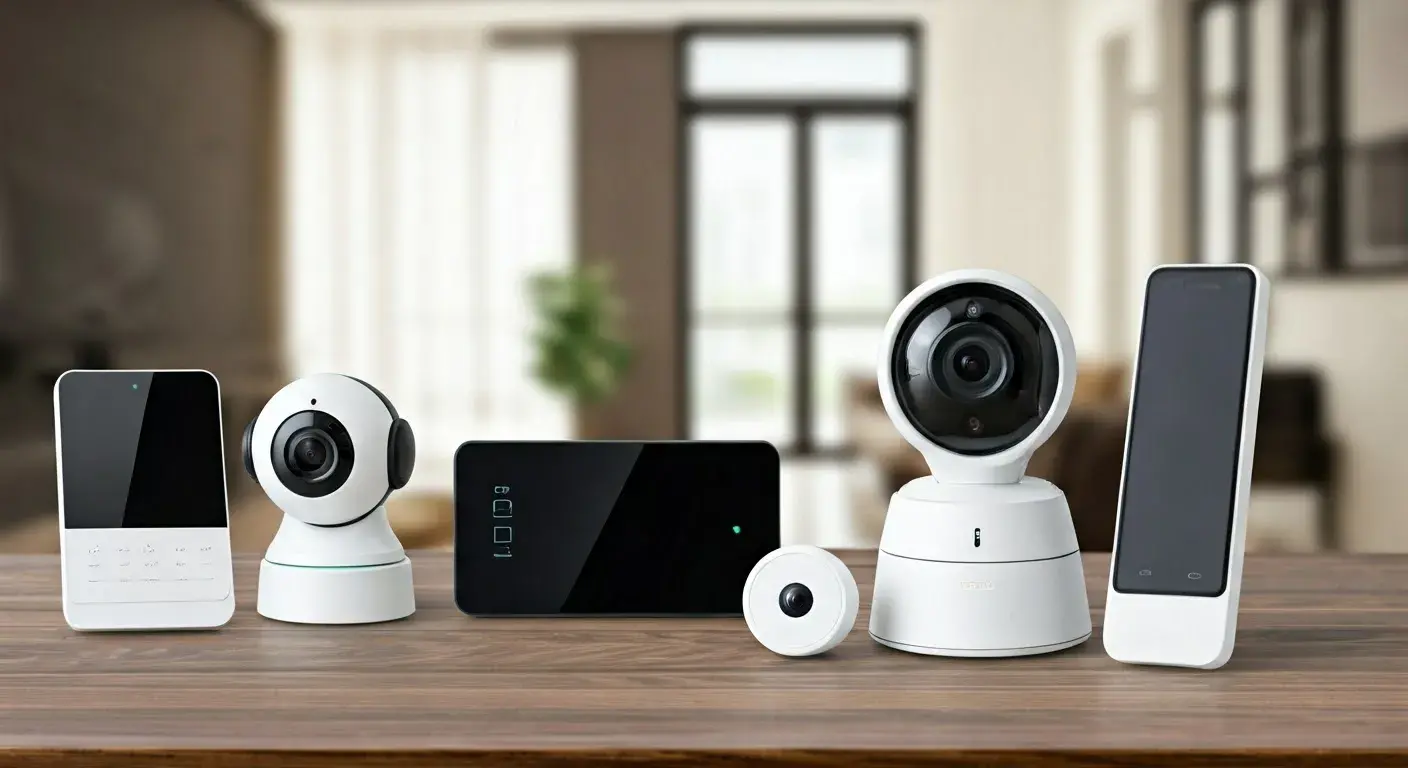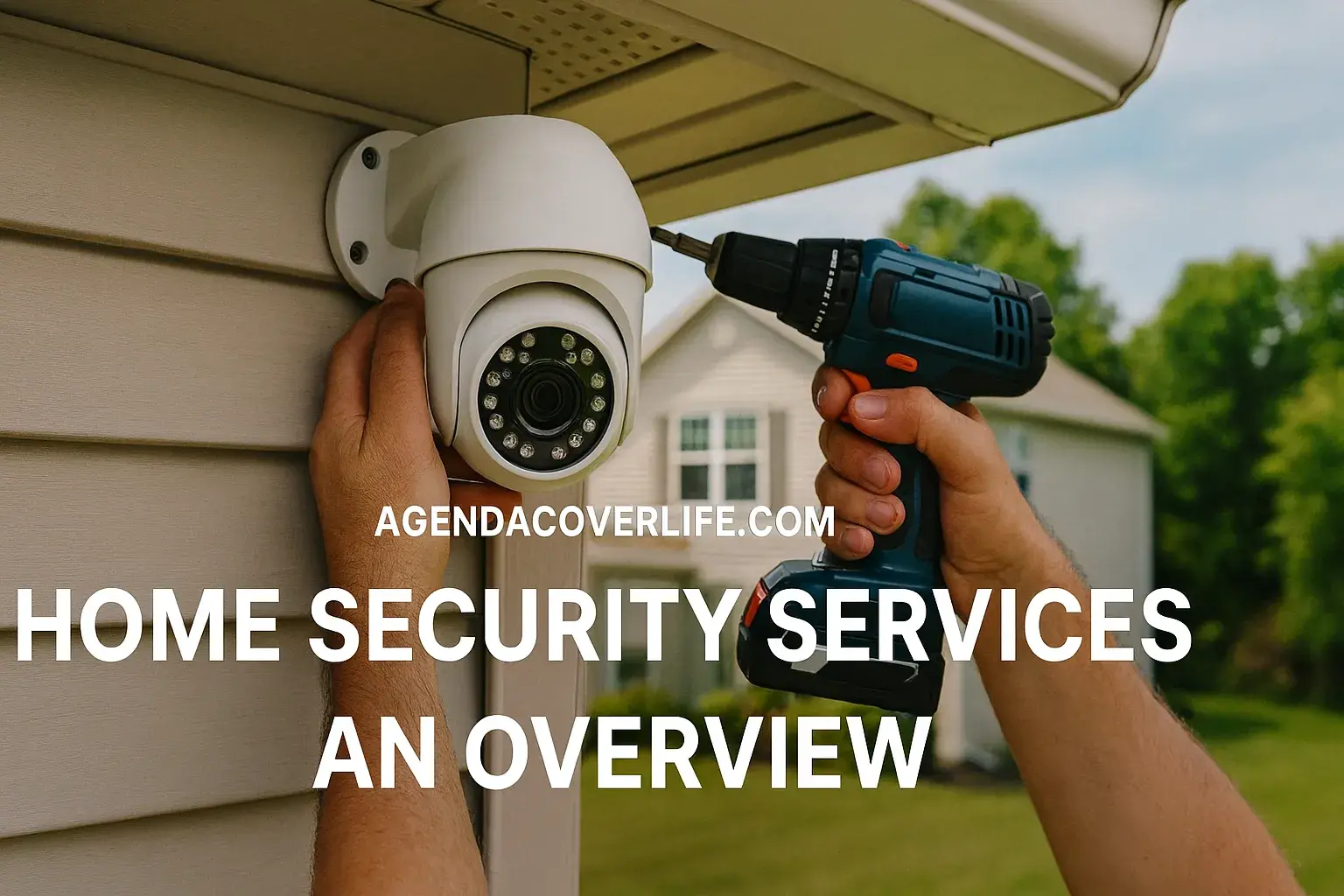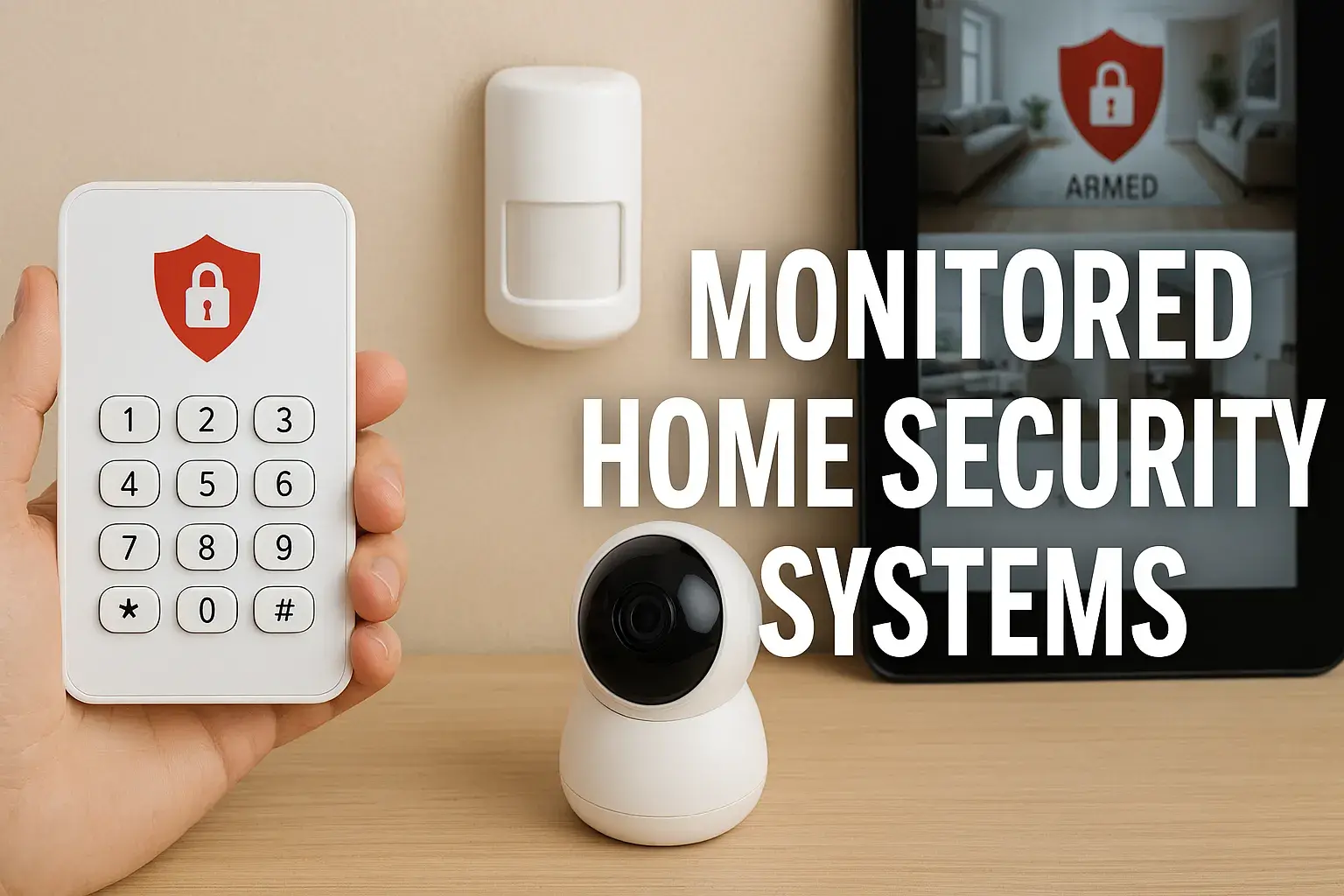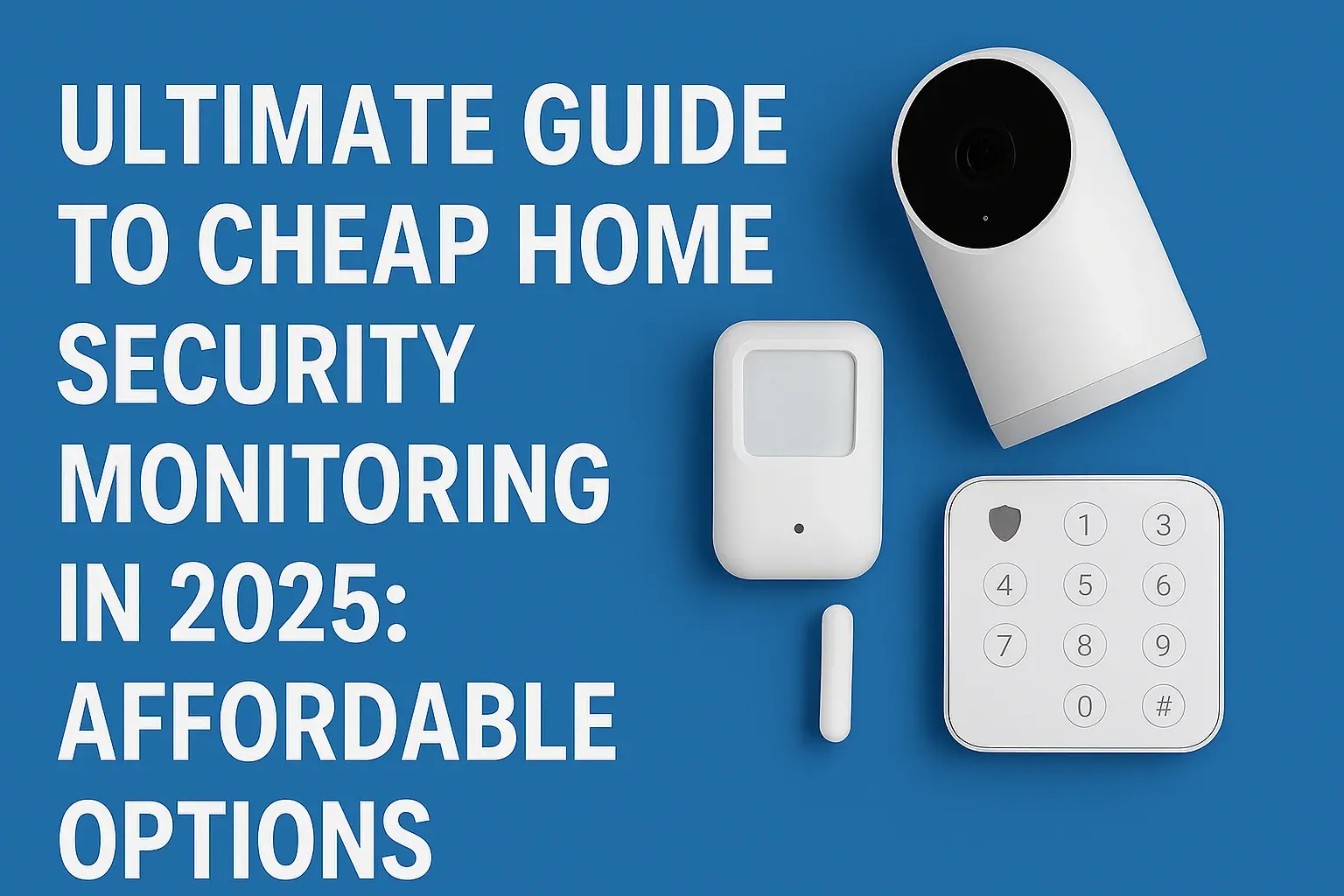In today's world, keeping your home safe has moved beyond regular methods. Smart home security systems are now more advanced. They combine the latest technology with easy-to-use designs. These systems help protect you from many different dangers. Whether you choose professional installation or want to set it up yourself, this blog will help you. It will provide important information about home security systems so you can decide the best way to protect your home.
Understanding Home Security Systems and Their Importance
A home security system is now a must-have, not just a luxury. These systems do more than keep burglars away. They take a complete approach to safety and security. They act like watchful guards, always ready for dangers like break-ins, fires, or carbon monoxide leaks.
With features like sensors, alarms, cameras, and round-the-clock monitoring, these systems create a strong defence against threats. If something does happen, they send important alerts. This helps with quick responses and can reduce damage or injury.
What Makes a Security System Essential?
A home security system gives you great peace of mind. Knowing that your home is being watched all the time helps you feel safe. This is very important for families. It helps children feel secure and lets parents worry less.
Also, a monitored system offers fast emergency response. In an emergency, every second matters. The monitoring centre can send help quickly, which can save lives during a fire, break-in, or medical situation.
In addition to safety, many home security systems work well with home automation. This means you can control lights, locks, and appliances from miles away. It makes your home more secure and easier to manage.
The Evolution of Home Security Technology
Home security has changed a lot since simple alarm systems. Now, new technologies like facial recognition are changing smart home security. These systems can tell the difference between people we know and possible threats. This reduces false alarms and makes things more accurate.
Also, video storage has gotten a lot better. We now have cloud-based solutions that give secure and easy access to recorded videos. This is very useful if something happens, as it can serve as proof for investigations.
The future of smart home security looks very good. With AI and machine learning, we can expect even bigger changes in how we keep our homes and families safe.
Exploring the Types of Home Security Systems Available
Choosing the right home security system can be tricky. There are different types to consider, like wired and wireless systems. Each type has its advantages and downsides. It's important to know what you need, your budget, and how comfortable you are with technology.
This section will look at the main differences between wired and wireless systems. It will also cover the difference between systems that are professionally monitored and those that you set up yourself. By learning about these differences, you can pick the security system that works best for you.
Wired vs. Wireless Systems: Pros and Cons
Traditionally, wired systems have been the top choice in smart security. They provide a dependable connection. They are not easily interfered with and are tougher against tampering. However, they need professional installation. This can be expensive and not as flexible about future changes.
Pros:
- Reliable Connection
- Tamper-Resistant
Cons:
- Professional Installation Required
- Limited Flexibility
Wireless systems use your home's Wi-Fi network. This makes them very easy to set up and manage. They connect well with other smart home devices and allow for more customization. But, they can face issues like Wi-Fi outages and signal interference.
Professional Monitoring vs. DIY Solutions
- Professional monitoring adds extra safety. It means trained experts will be contacted if your alarm goes off. They will try to reach you, and if needed, send emergency services to your home. This round-the-clock service comes with a monthly fee, which depends on the services and features you choose.
- A DIY home security system gives you control. You get alerts sent straight to your smartphone. You decide what to do next. While you won’t pay a monthly fee, you are fully responsible for watching and acting on the alerts.
- Choosing between professional monitoring and a DIY system depends on your budget, how much risk you can handle, and how involved you want to be.
Key Components of a Comprehensive Home Security System
A good home security system has different parts that work together to keep your home safe. Knowing what each part does helps you make better choices about how to set up and grow your system.
The central control panel connects to various sensors and detectors placed around your home. Every part is important for keeping your home secure. We will look at these key parts to understand their roles and why they matter for your home security.
Control Panels: The Brain of Your Security System
The control panel, also called the base station, is the main part of your security system. It gets signals from different sensors, cameras, and detectors. Then it looks at the information and takes the right action.
The control panel has a keypad or a touchscreen that lets you arm or disarm the system. You can also change the settings and control other smart devices that connect to your home network.
Some advanced control panels come with backup batteries and cellular connectivity. This helps your system keep working even if there is a power outage or if the internet goes down.
Sensors and Detectors: The First Line of Defense
Sensors and detectors are like the eyes and ears of your home security system. They are placed at doors and other weak spots to help protect your home from threats.
Motion detectors watch for movement. If they notice something strange, they set off an alarm. Window sensors activate when a window or door is opened, letting you know if someone tries to enter without permission.
Today’s security systems also include environmental sensors. These include smoke detectors, carbon monoxide detectors, and water leak sensors. They help keep your home safe from various dangers.
Cameras: Your Eyes When You're Away
Home security cameras work like your eyes. They show you what is happening and can scare off possible intruders. There are many styles and features to choose from, which makes it easy to keep an eye on your home.
Outdoor security cameras are built to handle bad weather. They give you a clear view outside, while indoor cameras let you see what is going on inside your house.
Many cameras provide live video. This means you can check on your home anytime. Some cameras also record only when they see movement, so you will not miss anything important.
Alarms: The Sound of Safety
The loud noise of an alarm system is a strong way to scare off people who might break in. It also works as an important alert, letting you know there is a danger and urging you to act fast.
Once an alarm goes off, the monitoring service you have can contact you right away. Skilled members of the team try to reach out to you and, if needed, send the right emergency response teams to help at your place.
Today’s alarm systems allow you to change many features. You can adjust the sound, how long it lasts, and what triggers it to fit your needs.
Top Rated Home Security Systems for 2023
Choosing the right home security system can be overwhelming because there are so many options available. To help you decide, we have put together a list of the best systems of 2023. We looked at their features, how well they work, and what value they provide.
These systems are the best in smart home security. They combine new technology, easy integration, and simple user interfaces.
System 1: Leading the Market in Innovation
[System Name] is a leader in smart home security systems. It uses advanced technology but remains easy to use. This makes it a great choice for a complete security solution.
The AI features, such as smart motion detection and facial recognition, are what make it special. These improvements help reduce false alarms and make sure real threats are detected correctly.
Besides its top security features, [System Name] also works well with smart home devices. It connects easily with Amazon Alexa and Google Assistant, so you can use voice commands and set up automation. With its stylish video doorbell options and strong mobile app, [System Name] offers an unmatched security experience.
System 2: Best for Easy Installation
For those looking for a simple security solution, [System Name] is the best choice. It has a DIY setup and a user-friendly design that makes putting it up easy, even for those who are not very tech-savvy.
The system includes pre-paired parts and a simple mobile app. This app helps you with each step, making installation easy.
Also, [System Name] has great customer service. Friendly experts are always ready to help with any questions or problems during or after your installation.
System 3: Most Reliable for Professional Monitoring
When you think about professional monitoring services, [System Name] is often seen as one of the most reliable options. It has a strong reputation for being excellent, which gives you peace of mind knowing your home is always safe.
Their monitoring ccentreshave well-trained staff. They follow strict rules to ensure they act quickly and correctly when alarms go off.
[System Name] also offers a variety of subscription services that fit your needs and budget. They have clear pricing and no hidden fees.
System 4: The Smart Home Enthusiast’s Choice
[System Name] is a great choice for smart home fans. It works well with many smart home systems, like Google Home and Amazon Alexa. This makes it a good fit for any automated home.
You can connect it with popular smart devices. This lets you make routines and automations that improve both security and convenience.
Just think about coming home to lights that turn on by themselves, doors that unlock as you walk up, and a security system that turns off automatically. All of this is possible with your [System Name] system.
System 5: Budget-Friendly Without Compromising Quality
Securing your home doesn’t have to cost a lot. [System Name] shows that you can get a good security system at a low price. It gives you great value without giving up the important features.
While it may not have all the extra features that more expensive systems have, [System Name] focuses on providing the basic things you need for effective home security.
Plus, it offers affordable professional monitoring options. This makes it a great choice for homeowners who want to save money but still want good professional security services.
Features to Look for When Choosing a Home Security System
Navigating the world of home security systems requires a clear understanding of what is truly important. While how it looks and its brand may catch your eye, it’s more important to focus on features that fit your needs.
Instead of getting swayed by marketing hype, look at practical things like smart home integration, mobile app features, options to customize, and strong customer support. By focusing on these areas, you can find a security system that meets your needs now and can grow with you later.
Integration with Smart Home Devices
In today's connected world, smart home integration is very important for any home security system. It’s good to have a system that works well with options like Google Nest and Apple HomeKit. This makes it easy to control different parts of your home from one place.
Think about it. You can tell your security system to arm itself, your lights to dim, and your thermostat to change to your ideal sleeping temperature. You can do all this with just your voice or a tap on your phone.
Choosing a system that fits well into your current smart home setup offers many automation options. This makes your home not only safer but also smarter.
Mobile App Functionality: Control at Your Fingertips
A good mobile app acts as the control centre of a modern home security system. It gives you remote control over your security. You can arm and disarm the system, watch live camera feeds, and get instant alerts, all from your smartphone or tablet.
Try to find an app that is easy to use. It should have simple controls and many helpful features.
Imagine getting a notice that your smart lock is locked. You can see the live feed from your front door camera. You can also disarm the alarm system from far away, all with just a few taps on your phone. This is the advantage of a great mobile app in home security.
Customization Options: Tailoring to Your Needs
Every home is different, and so are its security needs. Because of this, it is important to customize your system. Look for ways to adjust the system's settings, sensor setups, and alert options to fit your needs.
For example, you might want to set up custom zones in your home. This way, you can arm certain areas while leaving others unarmed. You can also change notification times so that you won’t be interrupted at specific hours.
Creating user profiles for family members gives you even more personalization. This lets you choose different access levels, which helps with both safety and ease of use.
Warranty and Customer Support: Ensuring Peace of Mind
A good warranty and strong customer support are very important when buying a home security system. A good warranty gives you peace of mind. It protects your investment and makes sure you are safe if there are any faults or issues.
Look for a warranty that covers both parts and labour for a fair amount of time. Also, having helpful and knowledgeable customer support is key when you need help with setup, problems, or any questions.
Check customer reviews and see the company's standing in customer service before you decide. A company that supports its products and cares about customer service can improve your home security experience greatly.
Installation Process of Home Security Systems
The way you install your home security system can affect your experience. You can either do it yourself or hire a professional. It's important to know the steps for both options.
In this section, we will explain the details of DIY and professional installation. You'll learn what to expect and how to make the setup easy and successful.
DIY Installation: A Step-by-Step Guide
Many new security systems are made for DIY installation. This lets homeowners put up their security setups. These DIY systems usually have easy instructions and simple mobile apps. They guide you through each step.
Here is a basic step-by-step guide to DIY installation:
- Plan your setup: Find the best places for your control panel, sensors, and cameras. Think about entry points, busy areas, and spots where you might not see well.
- Install the control panel: Pick a main spot with a steady power source. Follow the steps given by the maker to connect it to your Wi-Fi.
- Install sensors and detectors: Use the sticky strips or mounting tools that come with the kit to place sensors at doors, windows, and other weak spots.
- Test the system: After you put in all the parts, do a full test to check that everything works well.
Professional Installation: What to Expect
While installing things yourself can save money and be easy, getting professional installation gives you extra confidence. Trustworthy companies like ADT (with their self-setup option) or Vivint Smart Home have skilled workers who will take care of everything for you.
When you choose professional installation, you can look forward to:
- A full site check to find the best spots for sensors and cameras.
- Skilled work on wiring, connections, and setting up devices.
- Complete testing of the system to make sure it all works right.
- A clear guide on how your system features function and operate.
After the installation, professional companies usually provide ongoing support and maintenance plans for your peace of mind.
Tips for a Smooth Installation Experience
No matter, if you pick DIY or hire someone for professional installation, following these tips, will help you have a smooth installation for your home security system.
- Plan your setup well: Before you get started, take time to plan where to put the control panel, sensors, and cameras. Think about your home's layout, possible weak spots, and the areas you want to cover.
- Read the manual closely: It may seem simple, but reading the manufacturer's instructions closely can save you time and stress during the setup process.
- Test all parts: After setting up your system, it's important to test every sensor, detector, and camera. Make sure they sound alerts correctly and work with the control panel like they're supposed to.
Maximizing Your Home Security System
Installing a home security system is a great way to protect your property. To keep it working well over time, regular maintenance and software updates are very important.
Here are some simple tips to help you make the most of your home security system for many years.
Routine Maintenance Tips
Routine maintenance is very important to keep your home security system working well. If you do a few simple tasks regularly, your system can stay in great shape for many years.
One key maintenance task is to test your system often. This means triggering sensors, detectors, and alarms to make sure they are working right. You should also check and clean the sensors from time to time. Removing dust or debris helps them stay sensitive.
Don't forget about the battery backup. Many systems have backup batteries that help them keep running when the power goes out. It's important to check and change these batteries as the maker suggests. This will help you avoid any gaps in your protection.
Regular Software Updates and Why They Matter
In today's world, keeping your home security system's software up to date is very important. This is just as important as taking care of its physical parts. Makers often share software updates that fix bugs, boost performance, and, most importantly, offer security patches for new weaknesses.
Not updating your system's firmware can make it vulnerable to hacks and risk your home security. Many new systems can update automatically. This way, you get the latest security updates without needing to do it yourself.
Check your system settings and turn on automatic updates if you can. If not, make sure to check for updates often and install them quickly to strengthen your home security system.
Enhancing Security with Additional Devices
The great thing about modern smart security systems is that you can easily expand them. As your needs change, you can add new devices for better coverage and features. Top brands like Ring Alarm Pro give you many products that work well together, such as:
- Additional Sensors: You can add more door/window sensors, motion detectors, and glass break sensors to cover more areas in your home.
- Environmental Sensors: You can increase safety with smoke detectors, carbon monoxide detectors, water leak sensors, and freeze sensors that alert you to possible dangers.
- Smart Home Integrations: You can link your security system with other smart devices, like smart locks, smart lighting, and voice assistants, allowing for easy control and automation.
Cost Considerations and Value Analysis
Investing in a home security system needs some thought about costs and long-term value. The initial costs can change based on how complex the system is and what features it has. It's also important to think about ongoing costs, like monitoring fees and subscription services.
This part looks at the money side of home security systems. It helps you compare the upfront costs to long-term value. This way, you can make smart choices that match your budget and security needs.
Upfront Costs vs. Long-Term Value
When making a budget for a home security system, you need to think about more than the upfront costs. The first price of the equipment and installation matters, but the long-term value of the system is just as important.
A home security system is an investment in keeping your home and loved ones safe. A good system can help stop break-ins, reduce damages from fires or other dangers, and importantly, give you peace of mind for you and your family.
You should also think about the savings a security system might bring. Homeowners insurance often has discounts for homes with security systems. Plus, a system that is monitored by professionals can help get emergency responders there faster, which can lessen damage and losses during tough situations.
Subscription Services: Are They Worth It?
Many modern home security systems offer subscription services. These services give you extra features and better protection. They often include professional monitoring, cloud storage for video recordings, and the ability to control your system with mobile apps.
A professional monitoring plan comes with a monthly fee. This plan ensurethat s trained professionals get notified and can respond quickly when your alarm goes off. Having 24/7 monitoring can be very helpful, especially if you are away from home or can’t check alerts yourself.
In the end, deciding if subscription services are worth it depends on your needs, budget, and comfort with risk. Some homeowners value the peace of mind from professional monitoring. Others prefer to handle security alerts on their own.
How to Find Deals and Discounts
Finding a good home security system does not mean you have to spend a lot. With some research and the right timing, you can discover great deals and discounts. This helps you save money without losing quality.
Watch for seasonal promotions. Many security companies provide big discounts during holidays and major shopping events.
Think about bundling your home and auto insurance. Some insurance providers give discounts to homeowners with security systems. This can lead to large savings on your insurance costs.
Real-Life Success Stories: When Home Security Systems Save the Day
The technical parts of home security systems are important. However, nothing shows their value more than real-life stories. These systems can stop break-ins and help respond quickly to emergencies. They have many stories to share.
In this section, we will look at some real-life examples of how home security systems made a difference. We will show how they impact people's lives. We will also see the peace of mind they can bring.
Incident 1: Preventing a Break-In
The Smith family was asleep at home when some intruders tried to break in through their back door. As soon as the door moved, the loud sound of the alarm system went off. The noise scared the burglars, and they ran away without taking anything.
The Smith's security system was connected to a professional monitoring service. This meant that the company could quickly alert the police. In just a few minutes, officers arrived and made sure the family was safe. They felt a wave of relief after the police showed up.
This situation shows how important a home security system can be. The alarm's loud sound frightened the intruders away and led to a fast response from law enforcement. This highlights the value of break-in prevention measures for keeping homes safe.
Incident 2: Quick Response to Fire
The Johnson family went on vacation, leaving their home unattended. While they were away, a fire started in their kitchen. This happened because their old coffee maker broke down and caught fire. Luckily, their interconnected smoke detectors were linked to their home security system.
As soon as smoke filled the kitchen, the smoke detectors sent an alert. The monitoring ccentrereceived this alert and quickly reached out to the fire department. Thanks to their fast response, firefighters got to the house in time. They put out the fire before it spread to other rooms.
This situation shows how important it is to have a good home security system. With interconnected smoke detectors and professional monitoring, lives can be saved. The system detected the fire early and helped the firefighters act quickly, reducing damage to the home.
Incident 3: Monitoring Services Thwarting Theft
While the Williams family was on a fun cruise, their home security system was ready and alert. One afternoon, the security camera watching their backyard captured live video. It showed two people trying to cut through the fence.
The monitoring service, with live guard protection, quickly received the alert. They reached out to the homeowners and sent security personnel to help.
Thanks to the fast actions of the monitoring service, the would-be thieves were caught red-handed. The security guards stopped the suspects and avoided a possible theft. This shows how helpful monitoring services can be in thwarting theft, and highlights the extra safety that live guard protection offers.
Legal and Privacy Concerns with Home Security Systems
As home security systems get better, we need to think about the legal and privacy issues that come with them. It's important to find a good balance between safety and privacy. This means looking closely at laws about spying, how we protect data and any possible weaknesses.
This section will help you understand the tricky parts of legal and privacy concerns. It will give you the information you need to make smart choices and use home security technology responsibly.
Navigating Surveillance Laws
Before you put up security cameras or other monitoring devices, it's important to know the local surveillance laws. These laws are different in each area. They explain where you can place cameras, what you can record, and how long you can keep the recordings.
For example, recording sound without permission is usually not allowed. Also, you cannot place cameras in places where people expect privacy, like bathrooms or bedrooms.
You should also think about your nneighbour'sprivacy. Make sure your cameras are not aimed at their property or activities without their awareness or agreement.
Data Security and User Privacy
Modern home security systems can send and keep important information. This includes video recordings, sensor logs, and personal details. It's very important to think about data security and user privacy when picking a system.
Choose systems that have strong security features, like encryption for sending and storing data. Look for companies that focus on data security. They should have clear privacy policies that explain how they gather, use, and protect your information.
Be careful with systems that depend a lot on cloud storage. While cloud storage can be easy to use, make sure to select reliable providers. They should have strong security in place to keep your data safe from unauthorized access.
Future Trends in Home Security Systems
The future of home security is very bright. This is thanks to fast progress in artificial intelligence, the Internet of Things, and sensor technology. These changes are making security solutions smarter, more active, and more connected.
This section looks at new trends that will change home security in the years ahead. This includes AI that can predict threats and smart home systems that work together easily.
AI and Machine Learning Enhancements
AI and machine learning are changing home security systems. They are making them smarter and more responsive. These technologies analyze a lot of data from different sensors and devices. Here are some key benefits:
- Proactive Threat Detection: Picture a security system that spots strange activity. It can predict threats before they get worse.
- Personalized Security Profiles: AI can learn your family’s daily routines. It then customizes security settings and alerts just for you.
- Enhanced Accuracy: With AI-driven facial recognition and object detection, there are fewer false alarms. This means you are only alerted for real security issues.
The Role of IoT in Advancing Home Security
The IoT (Internet of Things) helps connect everyday devices and appliances. This is very important for improving smart home security. Devices linked together can cooperate to make your home safer and more aware.
Picture this: your smart doorbell spots someone suspicious. It then turns on your security cameras to record. At the same time, it tells your smart lights to blink, which can scare off the possible intruder.
These smooth connections and automatic actions are made possible because of the IoT. It helps create a connected and secure home system.
Predictions for the Next Decade
The next ten years promise great improvements in home security. These changes will help us protect our homes and loved ones better. Here are a few predictions for what next-gen security might look like:
- Invisible Protection: Security systems will be less noticeable. They will blend into the background while giving strong protection.
- Predictive Maintenance: Sensors and AI will team up. They will predict when systems might fail and alert homeowners and service providers before problems happen.
- Holistic Security Solutions: Home security will reach beyond just our homes. It will connect with community security networks and use shared data to make everyone safer.
Conclusion
Investing in a good home security system is very important. It helps keep your loved ones and property safe. As technology changes, these systems now include features like professional monitoring, smart connections, and easy ways to set them up. Make sure to focus on key parts like control panels, sensors, cameras, and alarms. They provide complete protection.
Be aware of laws and privacy concerns related to home security systems. Look into future trends like AI and IoT integration for better safety. Make a wise choice by considering the initial cost, long-term benefits, and the advantages of subscription services. Get peace of mind with a strong home security system that meets your needs.







